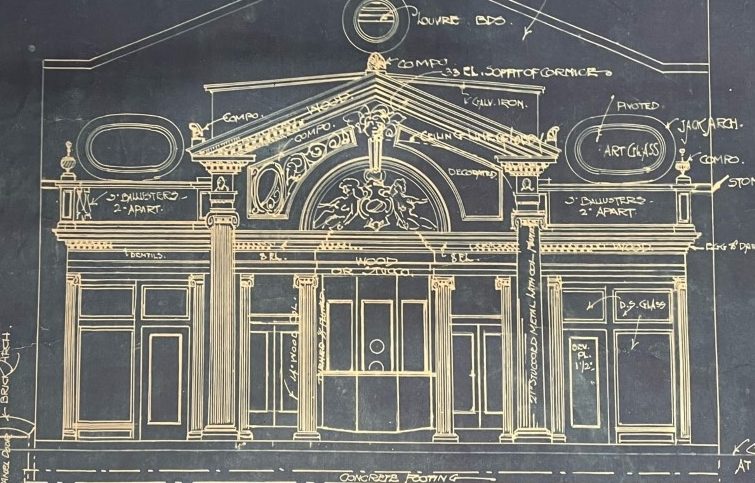Downtown Richmond seems to be perpetually under construction. The Library of Virginia has had several buildings downtown during its 200-year history and the 800 block of East Broad street where LVA now stands has had many other occupants over the years including a tavern, the offices of the Richmond Planet, a confectionary shop, and several theaters. Behind us, on Marshall Street, stands John Marshall’s house, as well as the John Marshall Court House, but until 1960 the Marshall House shared the space with John Marshall High School.
Despite the inevitable turnover, The Hippodrome Theater has occupied a place on 2nd Street in Jackson Ward since 1913. It has had different owners, even different buildings (the original burned down in 1945), but in some form or fashion it has survived for over 110 years. In its early years, as a stop on the “Chitlin’ Circuit,” the original Hippodrome brought Black vaudeville stars (“only high class refined vaudeville”1) through Richmond in addition to hosting every kind of event from movies, preachers, wrestling matches, and civil rights meetings. It marketed itself to the Black population of Richmond first as “Where the Crowds Go” and then as the place “Where You Meet Your Friends.”2
As of this writing, The Hippodrome’s Wikipedia entry credits the establishment of the Hippodrome to Charles Somma, a native Richmonder who owned and operated several theaters during his lifetime with business partner Walter Coutler. The citation for this statement is an old version of the Hippodrome’s own website and the “fact” can be found in many other Richmond histories, but journalist Kathi Clark Wong’s new book, Nickelodeons and Black Vaudeville: The Forgotten Story of Amanda Thorp, corrects the narrative. Although Somma was the owner and operator of the Hippodrome for many years, starting in 1916, he bought the establishment (as well as the Dixie Theater) from Ohioan native Amanda E. Thorp, who had built it in 1913.
Wong tells the story of Thorp, once hailed as the “Theatrical Queen of the South” and “The Movie Queen,” who may have owned up to sixteen theaters in Ohio and Virginia in the early 20th century including the Hippodrome which she established in 19133. When the original Hippodrome building burned in 1945, the Richmond Leader stated that it was “the city’s oldest moving-picture house for negroes.”4 Was Thorp, a white woman, a civil rights activist? Probably not, there is no remaining evidence that she saw her theaters in Jackson Ward as anything other than good business ventures.
In segregated Virginia, Thorp also owned several white-only theaters as well, allowing her to book movies and people in multiple theaters for multiple paying audiences. A March 1917 issue of the Richmond Virginian mentions a showing of “Daniel’s in the Lion Den” “so successful that [it] will probably be repeated” both at “the Bluebird Theater for white boys and at the Hippodrome for colored lads.” Although Thorp no longer owned the Hippodrome in 1917, she owned the Bluebird and probably had capitalized on such dual successes in the past. In fact, for certain live events like a famous wrestling matchup a “white section” was advertised for the Hippodrome itself.5
Although Thorp tended to establish and then sell-off her ventures quickly, including the Hippodrome, she established a lasting legacy that continues and until very recently has been misattributed. Many of her theaters were sold to the team of Charles Somma and Walter Coulter. In fact, Walter Coulter and his brother Bob had first arrived in Richmond from Ohio as employees of Amanda Thorp.6 She mentored Coulter who eventually took over many of her properties alongside Charles Somma. Somma and Walter Coulter partnered on many projects including the Tantilla Gardens. The pair opened the Byrd Theater in 1928, managed by Bob Coulter until 1971. This legacy seems to solidify the fact that if Thorp is not the “Theatrical Queen of the South,” she is at the very least “The Theatrical Queen of Richmond.”
Learn more about Amanda E. Thorp’s life by reading Kathi Clark Wong’s book Nickelodeons and Black Vaudeville: The Forgotten Story of Amanda Thorp. Join the author and the Common Ground Virginia Hisitory Book Group virtually on November 14th at 6pm to discuss this chapter of Richmond history. Registration is free but required.
Learn More About This Topic!
Books
Fuller-Seeley, Kathryn et al. Celebrate Richmond Theater. Richmond, Va: Dietz Press, 2002.
Jones, Janna. The Southern Movie Palace: Rise, Fall, and Resurrection. Gainesville, FL: University Press of Florida, 2003.
Jackson, Robert. Fade in, Crossroads: A History of the Southern Cinema. New York, NY: Oxford University Press, 2017.
Articles
Exhibiting Women: Gender, Showmanship, and the Professionalization of Film Exhibition in the United States, 1900–1930 (Women Film Pioneers Project)
The “Motion Picture Queen” (Richmond Magazine)
Please Enjoy the Show: Images of Richmond Theater (Valentine Museum)
Uncovered Spaces (Style Weekly)
Historical Media Coverage
Richmond Screen Weekly (Virginia Chronicle)
Dixie Theatre opening announcement (Richmond Evening Journal)
Airdome opening announcement (Richmond News Leader)
“Sues the Picture Queen for $10,000” target=new (Richmond News Leader)
Censorship of Uncle Tom’s Cabin (Evening Journal)
Hippodrome sale (Richmond Planet)
Footnotes
- “Hippodrome”, Evening Journal, April 21, 1913, page 10.
- Richmond Planet, May 29, 1915, page 4; Richmond Planet, January 08, 1916, page 5.
- Kathi Clark Wong, Nickelodeons and Black Vaudeville: The Forgotten Story of Amanda Thorp (The University of Tennessee Press, 2023), 70, 82.
- The Richmond News Leader, July 12, 1945.
- “Colored Wrestlers to Meet Tomorrow Night”, Evening Journal, November 15, 1914, page 2.
- Wong, 116.












